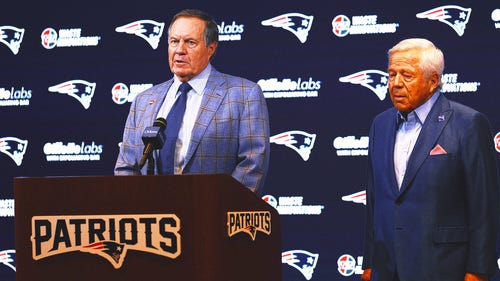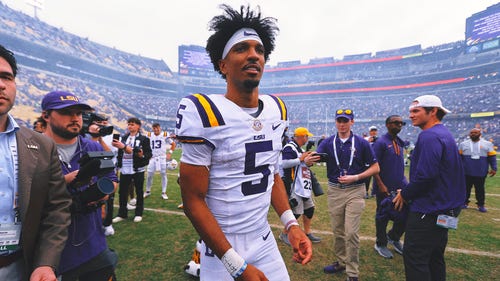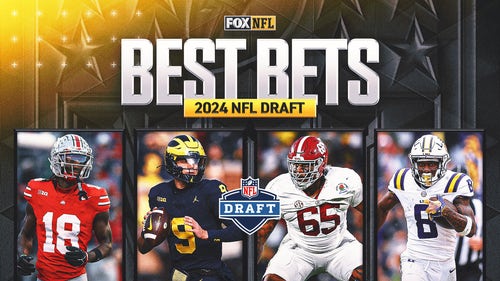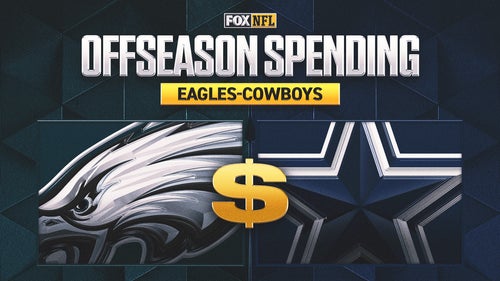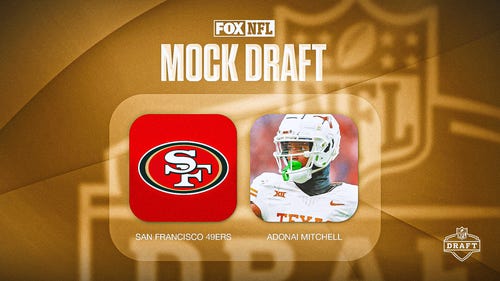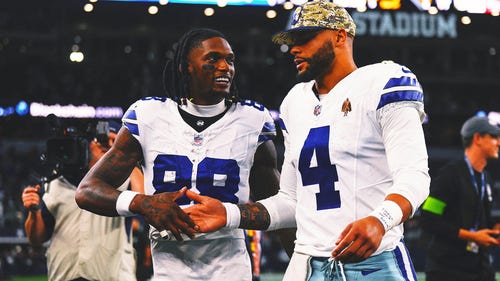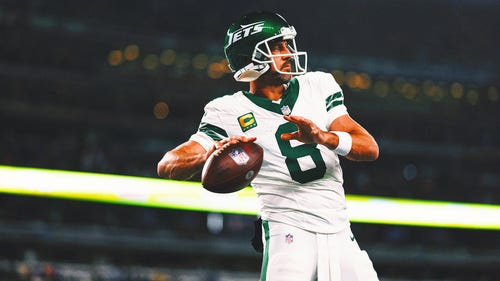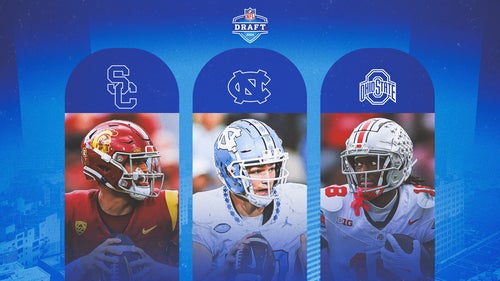
Young QBs more ready than ever
Thirty years from now, a grandfather is going to place his 11-year-old grandkid on his knee, and wax poetically about the 2011 Tennessee Titans. “It was a different time, you see,” he’ll say, rocking on his chair, clutching a football and staring off into the distance. “Rookies still held clipboards. They weren’t thrown into the fire right away. It was a simpler time. And parking at the games only cost $40.”
Times are certainly changing in the NFL, and the Titans’ 9-7 2011 campaign may go down as the last of its kind.
Matt Hasselbeck, 35, started all 16 games for a Titans squad that missed the playoffs last season. His statistics, performance and impact on fantasy leagues nationwide were by no means noteworthy, but the fact that Hasselbeck got the nod over rookie Jake Locker in each regular season contest is. For 16 games, the eighth overall pick of the 2011 NFL Draft sat and watched from the sideline. He held a clipboard, he learned from a mentor, and he absorbed the game.
We may never see a quarterback drafted in the first round afforded that luxury again.
With Locker in Tennessee, rookie Ryan Tannehill in Miami, and 2012 third-round selection Russell Wilson in Seattle all being named their respective teams’ starting quarterbacks last week — 10 of the 32 opening day starters next weekend will either be first- or second-year players. All four first-round selections from April’s draft will be starting in their respective NFL cities, and with Wilson getting the nod over free agent acquisition Matt Flynn in Seattle, five rookies — or roughly one sixth of the league’s starting quarterbacks — will be “QB1.” The league hasn’t seen five rookies start on opening day since the NFL merged with the AFL in 1970.
It’s a young man’s game — especially at the quarterback position.
So, why the rush on all the young gunslingers around the league?
Here are my four reasons:
1. They are ready
With college offenses now more diverse than ever before, and in many cases, more sophisticated and complex than some of the ones we see in the pros — accomplished college quarterbacks are more prepared to jump right into the fray than they were a decade or two ago.
In Russell Wilson’s case, this isn’t a deer in headlights being thrown out into traffic. For three years as the starter at North Carolina State, Wilson mastered a West Coast offense. After transferring to Wisconsin, he took a Badgers team to the Rose Bowl running a power running offense. He’s seen it all and he’s flourished with every offensive scheme thrown his way.
Robert Griffin III ran a variation of a spread offense in college, but was especially proficient in identifying mismatches prior to taking a snap.
Andrew Luck is already considered one of the game’s most advanced offensive minds.
Cam Newton — criticized by draftniks for not running a pro-style offense in college at Auburn — used his mastery of the spread to his advantage in 2011. Considered a “risk” by many around draft time for a limited playbook in college, he went on to break just about every rookie passing record in NFL history, despite not having the luxury of a proper NFL offseason. There are no questions about whether Newton can flourish in an NFL offense now.
These guys aren’t coming from Wishbone offenses anymore. In many cases, they’re the ones who are ahead of the curve on what’s next in the NFL.
2. They’ve had success
There was some second guessing back in 2008 when Baltimore Ravens first-year head coach John Harbaugh named Joe Flacco — the 18th pick in the 2008 NFL Draft — his opening day starter during the preseason. There were similar question marks around Mike Smith’s decision to throw Matt Ryan — the third overall pick in that draft — into the fire in Atlanta that year. Both rookies went on to lead their teams to the playoffs, with Flacco coming up a few plays short of the Super Bowl.
A year later, Mark Sanchez took his New York Jets to the AFC Championship Game as a rookie, and in 2010, Sam Bradford momentarily turned the St. Louis Rams around, coming just one win shy of the playoffs, and winning the 2010 Offensive Rookie of the Year Award.
In 2011, Newton shattered records, while Andy Dalton and T.J. Yates became the first rookies to square off in a playoff game since the 1970 AFL-NFL merger. There’s a track record, here. These guys can succeed right away. Whereas coaches and GMs used to treat their rookie quarterbacks with kid gloves — nurturing, coddling, restricting them until they’ve fully blossomed — there’s too much of a history of recent success stories to do so anymore. If the kid is ready, he’s got to play. And in some cases, like Blaine Gabbert last year, they might not be.
3. It’s a business
Coaches and general managers are under the gun to win and win fast like never before and the urgency to find a new hope at quarterback — a true face of the franchise — who’ll turn a losing team into a winner is very real and very serious.
If you’re going to put your name on the line and draft a quarterback in the first round, you’re going to want to see what he can do as soon as possible. With a new quarterback comes new optimism around the team from the fan base, new energy within the facilities, and an untapped well of new marketing dollars.
The rookie quarterback’s jerseys will be sold. His T-shirts will be bought. The Cleveland Browns have had 10 opening day starters since 2000. This year, they’ll start the season with another one — Brandon Weeden, the rare 28-year-old rookie — and there’s another round of “fresh start” or “new beginnings” storylines out of Cleveland.
The fans wouldn’t have been nearly as excited by Colt McCoy being named the starter and the current head coach, Pat Shurmur, didn’t handpick McCoy as his future quarterback. So, Weeden’s the guy. This is as much about Shurmur and the front office as it is about Weeden.
Don’t kid yourselves, when you pay a first-round quarterback first-round money he’s going to get a shot. Locker in Tennessee last year was the rare exception. He may be the last of his kind.
4. NFL coaches are ready for rookie QBs
The old way was set in stone. You sat and you waited. With the very rare exceptions like Peyton Manning or Dan Marino, you’d get tossed into the action here and there during your rookie season, and by Year 2, or in many cases, Year 3, you were finally handed the reins as the starting quarterback.
It’s amazing to think that one veteran quarterback (Chris Chandler) started for two full seasons with Steve McNair holding a clipboard behind him in Houston and Tennessee, then started another full season in Atlanta as Michael Vick waited his turn behind him. Chandler had done some things in his career, but McNair was the third overall pick in 1995 and Vick was the top pick in 2000.
In today’s game, there’s very little chance Chandler would have been in front of either of those guys in their rookie seasons, let alone the entire year. As prepared as the rookie quarterbacks are for the NFL, professional coaches are now ready for the rookie quarterbacks. There’s a system in place.
Steve Beuerlein, a quarterback who played 17 years in the league, has seen it all both as a young guy and a veteran journeyman. Working for CBS Sports now, Beuerlein explained to me, “NFL coaching at the highest level has gotten to the point where they now really understand how to bring a young quarterback along. They know that when they take that high draft choice, that player is going to be expected to play pretty early. They have a way to train them and integrate them into the system much easier now. Most of these coaches have been through this a few times by now and they know that there’s a right way and a wrong way about bringing these kids along.”
Like anything else in the game, the rookie quarterback situation has been fine-tuned and perfected. It’s down to a science.
This trend is not a fad. It’s the New World Order in the National Football League. Pour a drink out for the 2011 Tennessee Titans. They were the last of a dying breed.






































































































































